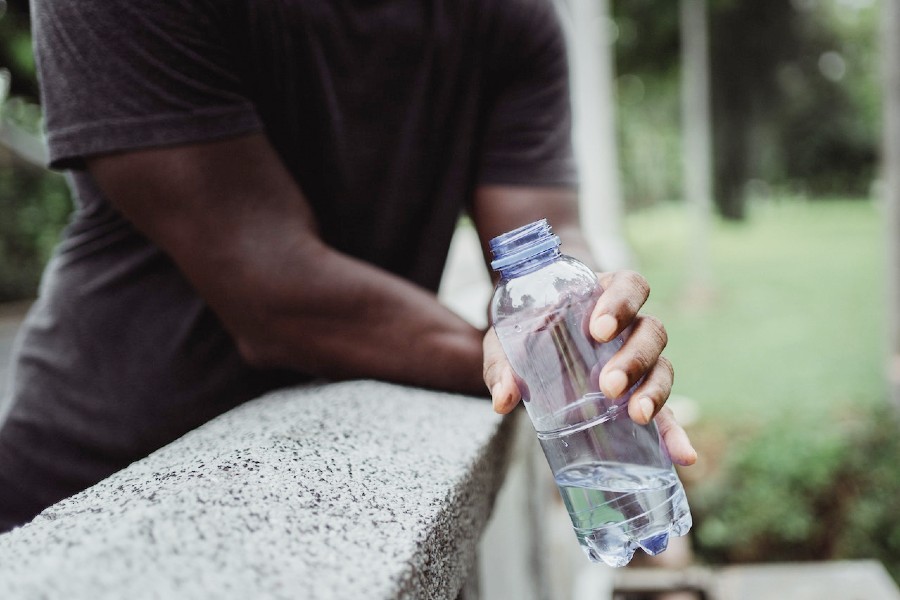
The human body needs water to function. It plays a role in regulating many functions, such as regulating temperature and the flow of nutrients.
When you breathe, sweat, urinate or defecate, you lose water. If you don’t replace the water you lose, you become dehydrated. There are certain signs you can look for that indicate that you are dehydrated. If you take notice and drink more fluids, you can avoid the consequences of dehydration.
Signs of chronic dehydration
Thirst is a basic survival instinct that makes you want to drink. Older adults may not feel thirst sensations until they are already dehydrated, so it is not always a reliable indicator of dehydration. There are several levels of dehydration, and mild dehydration is easy to treat, whereas chronic dehydration requires medical attention. The symptoms of dehydration include:
- Color of urine: The color of your urine is one of the major indicators of your level of hydration. If it’s a pale yellow, this indicates that you’re well hydrated. If your urine is an amber color, it indicates that you’re mildly dehydrated. You will need to increase your fluid intake to prevent becoming seriously dehydrated. If your urine is a burnt orange color and strong smelling, you need to find out whether this is due to dehydration or some other cause.
- Frequency of urination: Most adults urinate from four to ten times over a 24 hour period. If you urinate less than this, you should increase your fluid intake. If you start to urinate more and the color of your urine becomes lighter, the color change is an indication that you were dehydrated.
- Other symptoms: Some other symptoms of mild dehydration include fatigue, headaches and a dry mouth, eyes and lips. If you increase your fluid intake, these symptoms should disappear.
- More serious symptoms: Chronic dehydration can cause many unpleasant symptoms. You may experience dizziness, irritability and confusion.
Drip Hydration, Reset IV and Mobile IV Medics offer at home IV infusion to help you recover from dehydration and receive the fluids and electrolytes your body needs.
Causes of dehydration
Dehydration can occur for a number of reasons, such as being sick, busy, or not having access to safe drinking water while hiking or traveling. Factors such as your activity levels, age, body weight, etc., all affect how much you need to drink. The severity of your dehydration also depends on various factors, such as your level of physical activity, your diet, and the climate you live in.
- People who are more active will sweat more. They need to make sure they replace the fluids they lose, or they could suffer from dehydration.
- When people are ill and have a high fever, they can also lose a lot of fluid. Drinking enough fluids is essential after having a high fever.
- It’s well known that babies suffering from vomiting or diarrhea are at high risk of dehydration, especially if they have a fever as well
- Extended sun exposure is another cause of dehydration, due to hot, humid weather increasing the amount you sweat.
- Drinking too much alcohol also causes dehydration because alcohol is a diuretic.
- Older adults may take medications or have conditions that increase their risks of becoming dehydrated. Some diuretics and blood pressure medications cause increased urination. Those with kidney diseases are also at higher risk of dehydration.
- Uncontrolled diabetes can cause you to urinate more and become dehydrated.
Treatment

Preventing dehydration is better for your body than treating it. Most people can let thirst be their guide on how much to drink. you should also include foods high in water, like fruits and vegetables, in your daily diet. It’s important to be aware of the causes of dehydration and make sure you drink extra water when conditions increase the risk of dehydration.
Fortunately, mild to moderate dehydration is easy to treat. All that’s required is increasing fluid intake and replacing electrolytes.
Another way to rehydrate your body is by using oral or IV supplements. Oral supplements that require long-time regular use can help you get the needed vitamins. With IV fluids, all the necessary vitamins, minerals, and electrolytes go directly into your veins and you feel an immediate energy boost within 30-60 minutes. To most patients, types of IV fluids look exactly the same but every bag of saline may have a totally different chemical composition, vitamins, and add-ins. Your health complications, symptoms, and needs influence what your doctor will recommend.
Ignoring signs of dehydration can result in a medical emergency. If you become chronically dehydrated, you will likely need to go on an IV drip to replace lost fluids and electrolytes. If this doesn’t happen, you could experience seizures, and your respiration and heartbeat may become rapid. You could eventually become delirious and lose consciousness. Low blood volume shock is another serious complication of chronic dehydration that causes a drop in blood pressure and oxygen amounts in your body.
Become a Harlem Insider!
By submitting this form, you are consenting to receive marketing emails from: . You can revoke your consent to receive emails at any time by using the SafeUnsubscribe® link, found at the bottom of every email. Emails are serviced by Constant Contact








